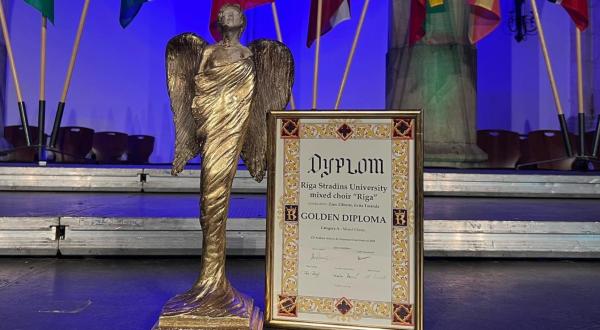RSU Administrative Employee of the Year 2023 – Andreta Slavinska
Knowledgeable, forthcoming, helpful and a great support to her colleagues in their day-to-day work with the foresight to anticipate the needs of the healthcare sector and to plan and organise teamwork accordingly, not only on a daily basis but also in difficult non-standard situations. This is what colleagues wrote about Deputy Director of the Rīga Stradiņš University (RSU) Medical Educational Technology Centre (METC) Andreta Slavinska (pictured) nominating her for the RSU Annual Award.
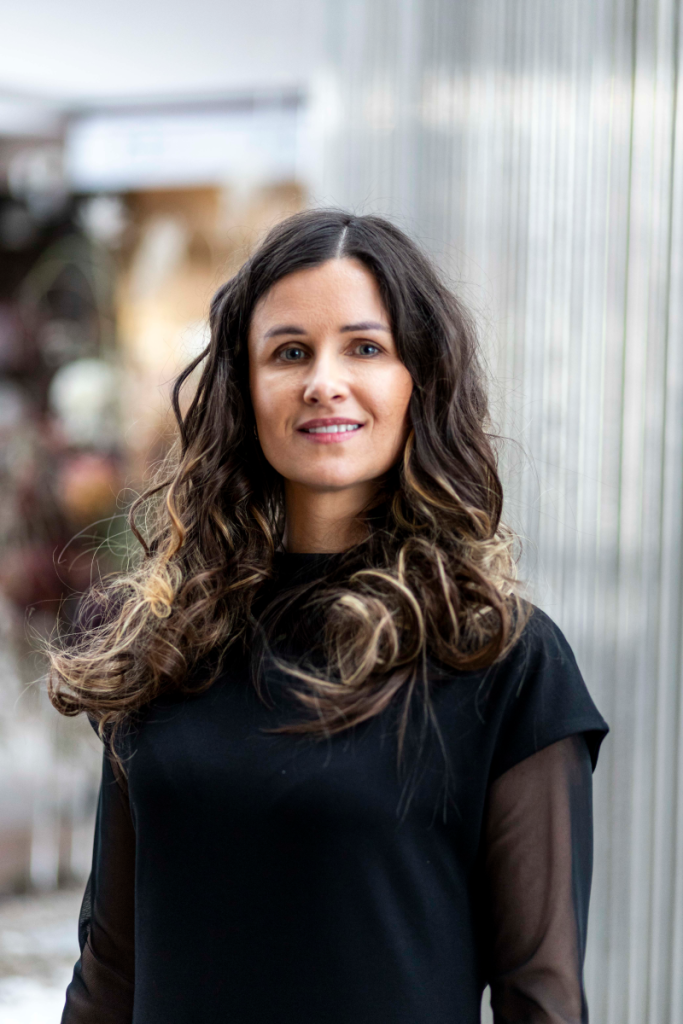
In February, it will be 13 years since she started working at RSU. ‘I am convinced that it is a natural consequence that I work at RSU.
I am passionate about the field I work in, I love my work and truly appreciate the unique freedom that RSU gives me.’
Slavinska says: ‘I am very fortunate that my professional activity coincides with my research interests, which are simulation-based education and the concept of safety in medicine and health care.’
What was your path to RSU?
I started working at RSU in 2011 at the Rehabilitation Research Laboratory of the Faculty of Rehabilitation under the supervision of Prof. Aivars Vētra. While working there, I had the opportunity to gain invaluable experience and I am grateful to Prof. Vētra for two qualities that this experience developed in me: the first one – to dare to think unconventionally and boldly; the second one – to take responsibility for my ideas, which means standing up for them to the end, regardless of how much time and effort it may sometimes take.
I started working at the METC in 2013. At that time, it was managed by Roberts Rezgalis. Alongside my work at METC, I worked for a while at the Department of Clinical Skills and Medical Technology, which was established in 2014 and is still managed by Assoc. Prof. Oļegs Sabeļņikovs.
From the beginning, the work at the METC and the Department of Clinical Skills and Medical Technology was very interesting and challenging. The METC was the first simulation centre in Latvia with simulation rooms, modern simulation technology, and a small number of people with little experience in the field. However, it lacked a framework for integrating a simulation-based education approach into the study process.
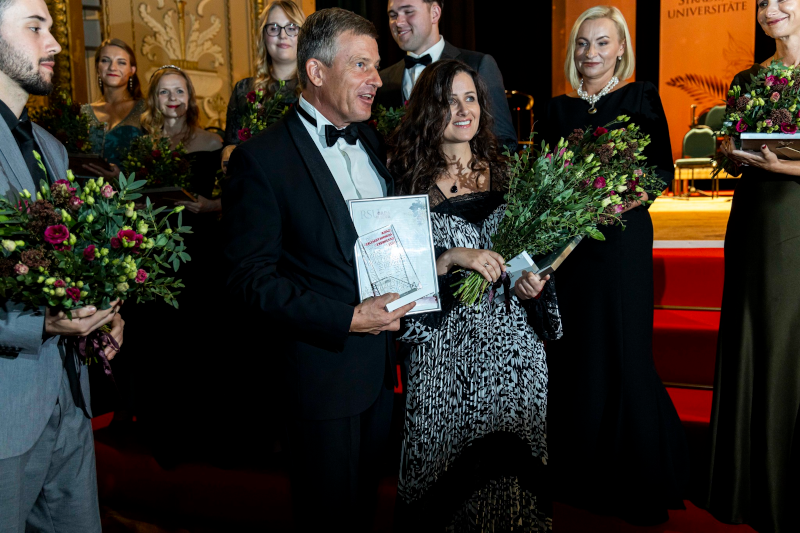 The RSU Annual Awards in the Administrative Employee of the Year category was presented to Andreta Slavinska by Vice-Rector for Administration and Development Toms Baumanis at the RSU Academic Ball held on 9 September 2023 at the Riga Latvian Society House.
The RSU Annual Awards in the Administrative Employee of the Year category was presented to Andreta Slavinska by Vice-Rector for Administration and Development Toms Baumanis at the RSU Academic Ball held on 9 September 2023 at the Riga Latvian Society House.
The first enthusiasts to conduct simulation-based classes at the METC were Assoc. Prof. Sabeļņikovs, Assoc. Prof. Anna Miskova, Acting Assistant Marina Šarkele, a little later also Asst. Prof. Artūrs Balodis and Acting Assistant Edijs Šmagris. The first to think about simulation technologies and the relevance of simulated environments to learning objectives were medical equipment engineer Aleksejs Rutkovskis, simulation specialists Ingre Dižā (currently IT project manager at the RSU Information Technology Department) and Ieva Bunce. The Director of the Centre for Educational Growth, Assoc. Prof. Nora Jansone-Ratinika, also played a major role in the development of both simulation-based education at RSU and the METC. These people were the first to develop the conceptual framework for simulation-based education at RSU and to create practical solutions for integrating this approach into medical and health care education. I must also mention Vice-Rector Toms Baumanis who initially supervised the METC – Baumanis has always supported the METC and continues to care for its development today.
I have had the opportunity to work and contribute to the development of both simulation-based medical and healthcare education and the METC for all these 10 years.
Progress is evident – the METC’s simulation technology capabilities have expanded every year, the simulation environment has improved, professional capacity has increased and most importantly – awareness of the importance of simulation-based education in medical and health care education at RSU and in the medical and health care sector as a whole has developed.
At the end of 2023, the signing of a Memorandum of Cooperation between eight institutions to develop a national strategy for simulation-based medical education was particularly gratifying. I have been nurturing this idea since 2014, and we can be proud that we have been able to unite so many interested organisations for this purpose. But at the same time, I know that it is important not to stop now, to take responsibility, and to carry on.
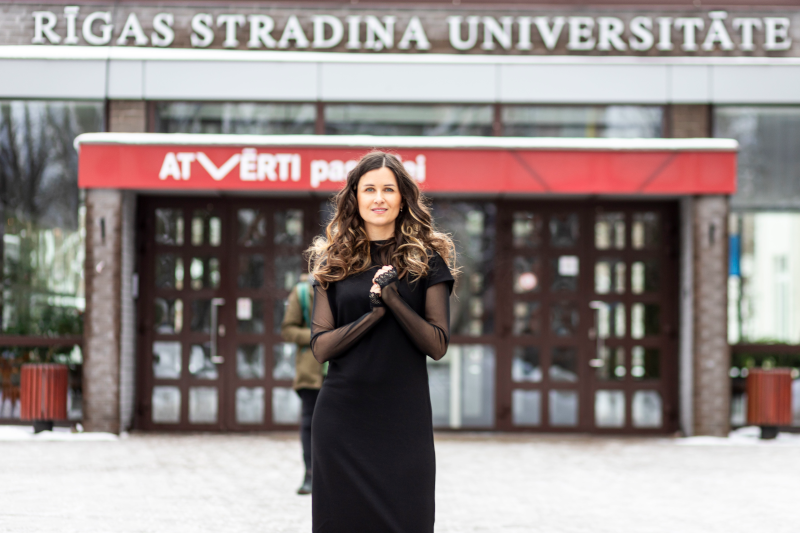
What is it like to run a centre as big as the METC?
It is indeed a big centre – it currently employs more than 50 specialists from different fields: medicine and health care, medical engineering, project management, procurement procedures, etc. I have to say that this diversity is the key to the METC’s success, but it is also a big challenge.
To manage a centre with so many different personalities could be described in one word – interesting. I would like to stress, however, that
this is not a question of management, but rather about the ability to work together and to see the person behind each job, the ability to correctly assess and harmonise circumstances and the ability to move processes towards a common goal.
Therefore, in my opinion, several things are important in managing the centre. Firstly, it is important to see the global development trends in simulation-based medical and health care education and to understand what the main goals and objectives of the METC are, both in the short and long term. Simultaneously, I have to think about real opportunities and what needs to be done at the level of the METC and nationally to promote the development of the field as a whole. Secondly, there is a need to form and support a team of professionals who work together to ensure that the METC’s goals and objectives are achieved. Thirdly, it is important to build and develop cooperation with institutions representing the industry to promote the integration of simulation-based education into all levels of education to improve the quality of education and health care.
What knowledge and character traits are essential to managing the METC?
In my opinion, to manage the METC one must be able to navigate the field of higher education, be competent in the basic principles of simulation-based education, to have an understanding of medical and health care aspects, and good team management and work organisation skills. At the same time, it is important to be focused and decisive, and to remain calm in difficult situations.
But the most important thing is to be creative and dare to do things even if you are a scared.
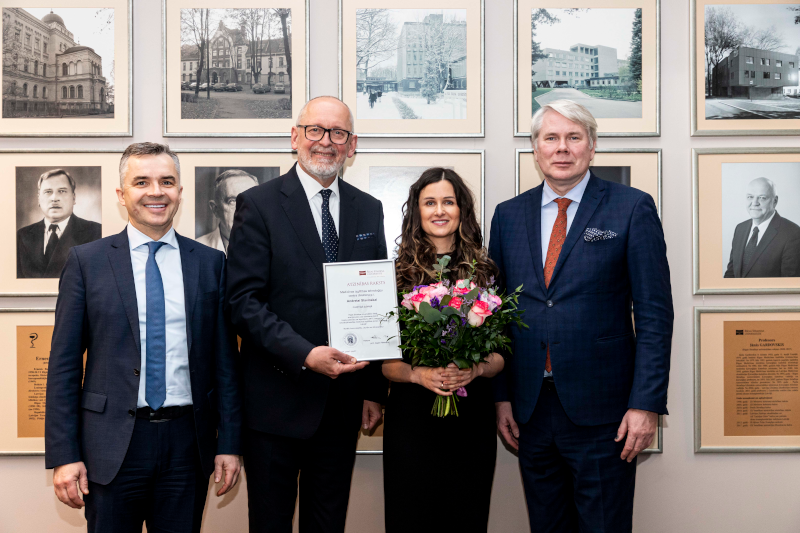 On 9 January 2024, RSU management congratulated Andreta Slavinska on her milestone anniversary, expressing gratitude for her contribution to the growth of the METC and the development of simulation-based medical education in Latvia.
On 9 January 2024, RSU management congratulated Andreta Slavinska on her milestone anniversary, expressing gratitude for her contribution to the growth of the METC and the development of simulation-based medical education in Latvia.
What is your management style?
This might be best described by my colleagues [smiles], but there are some principles that I try to follow in my work. Firstly, you need to get to know your colleagues and understand what their strengths are and where their potential can best be realised in the context of the METC. In other words, to match each person’s talents with the needs and capabilities of the centre. Secondly, to define and explain as clearly as possible the goal and objectives that need to be achieved, while ensuring that my involvement and support are available at all times. Thirdly, timely planning of all works and providing the necessary resources.
If something fails, it is most likely due to a mistake on my part in one of the points I outlined – I might not have assigned the task to the right colleague, explained a task clearly enough, or I might not have allocated sufficient time and resources for a task.
Some colleagues joke that I have an authoritarian-democratic management style, but to be honest,
I simply feel responsible for creating an environment where colleagues want to work, where there is a positive and creative atmosphere, mutual understanding, peace and harmony.
While working at the METC, I have learnt that the most important thing is to do the best that is possible at a given time and place. Also, that everything has its own pace and nothing can be rushed or slowed down, and finally that people should be given the space to be creative and to think.
People must be trusted to do great things!
What can throw you off balance at work?
Usually, work issues can’t throw me off balance. There are just some things I don’t like – made-up problems, inconsistency, sloppiness.
What do you like to do in your free time?
This is a difficult question to answer, as my daily routine consists of my duties at the METC and challenges I have set for myself – currently, this is my doctoral thesis. I also have to try to balance everything with the needs of my family with my three adorable children who are growing up and trying to find their place in the world. Basically, I am on the move all the time and I am grateful to my husband, who supports me and provides the necessary conditions for me to do only what I love.
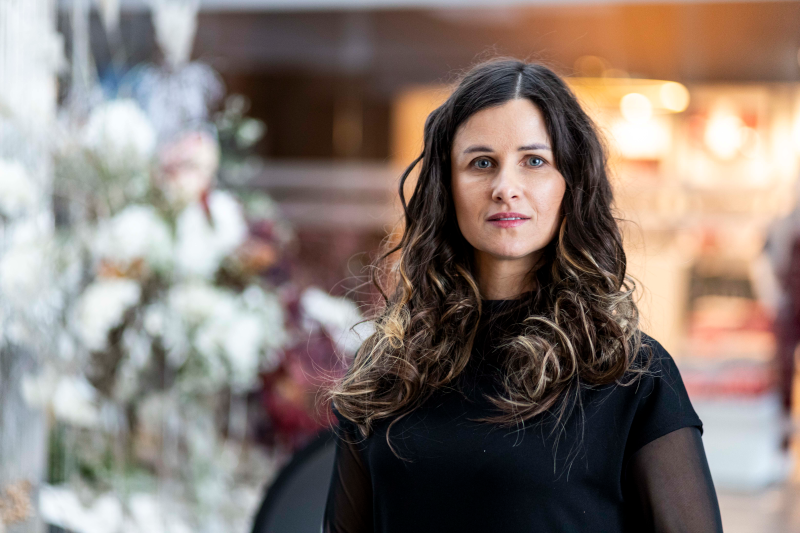
What are your interests or hobbies?
I have an interesting characteristic – once I start doing something, sooner or later I get passionate about it. [Laughs] It’s important to start, but at this time in my life, I have more responsibilities and duties so there is basically no time left for hobbies. If I had free time, I would definitely enjoy reading biographical books about historical figures.
Christmas and New Year are behind us... How do you celebrate these holidays?
I devote this festive season entirely to my family. Christmas dinner, which has become a tradition in our family, is particularly important as it is a beautiful time to be together with my relatives in our country home. New Year is usually celebrated with family, friends and neighbours.
At the end of the year, I usually look back at what has been achieved and set goals for the coming year. It is not a list of wishes or resolutions, but specific results to be achieved with tasks and a timeline that acts as a road map for the new year.
May 2024 be a wonderful year full of creative success for everyone!
